Lacrosse is more than just a sport to Warren Hill. It is more than a lifestyle choice, and it is more than a passion project. It is an unmistakable and inseparable piece of his identity.
There isn’t a time that Hill remembers lacrosse not being a part of his life – this is often how the story of Indigenous players starts. When Indigenous newborns are gifted a stick in their cribs, this is the moment that lacrosse becomes part of them. Hill remembers the days of his youth when he and the kids from Six Nations couldn’t wait to get back outside to play the game.
“I think I’ve been in love with the game since day one, truthfully,” Hill said. “Another truth: I don’t think I had a choice to not be a lacrosse player. Obviously, being from Six Nations and having the roots of the game with our people. It was just something that was in your face down here. As soon as the snow melted away and you could get outside, you’d see kids running around, shooting at the net, or playing catch.”
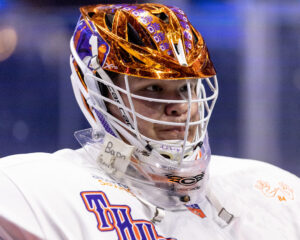
From the age of five years old, Hill was already beginning to play organized lacrosse in the Six Nations minor system. His coach was Randy Staats’ dad, Marty. Hill didn’t go into the game knowing that he wanted to be a goalie, but after volunteering to play the position a few times in Paperweight, then by his Tyke years, Hill was told that he would be the team’s goalie.
“I became a goalie because Randy Staats’ dad was my coach growing up,” [Randy] and I are the same age, so we played together all the way growing up. Randy’s dad asked me to go in net one time and I loved it. He [jokingly] said that I couldn’t run, and we always have a debate about that, but basically, our team didn’t have a goalie, I volunteered and I never looked back.”
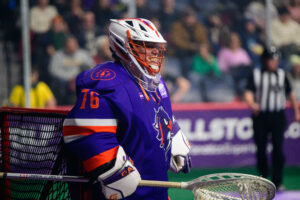
For Hill and many Indigenous players, summer ball in their communities was the lacrosse they were most exposed to. Hill had the privilege of not only being able to see the Indigenous stars that came before him play in the summer (and in the NLL), but he was related to a few of the more notable Indigenous players from the early 2000s, including his first cousin, Roger Vyse, and his uncle, Cory Bomberry. Delby Powless was Hill’s high school coach, and goaltender Ken Montour was also a teacher in the community.
All four of these Indigenous stars were teammates on the 2008 NLL Championship-winning Buffalo Bandits. Getting down to Buffalo for those games was a privilege and made a considerable impact on Hill and his pursuit of pursuing a lacrosse career. Because the opportunities to watch games in person or on TV could be a challenge for some, Hill cherished the moments he had to be around the game.
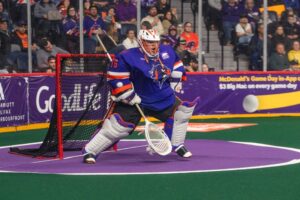
“At that time, it’s not like everyone down here didn’t have internet or access to YouTube,” Hill said. “But, if you went down to the lacrosse rinks and you watched the [Six Nations] Arrows play, or maybe you were fortunate enough to go to a Bandits game when it was popping off back then, those were our superstars, and that’s who we aspired to be.”
When Hill was eventually able to follow his idol’s path and play at the professional level in the NLL, it was a dream come true. Hill was drafted in the 2nd round, 20th overall in the 2016 NLL Entry Draft. Since, he has consistently been an above-average goaltender who often showed levels of excellence.
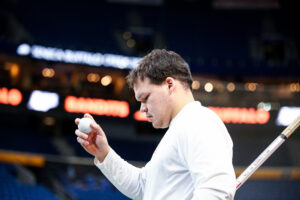
Hill has taken every opportunity in between the pipes as a chance to improve. It’s been essential to make the most of every chance in net because he got a later start in the pros than most. When he was drafted back in 2016, Hill was 24. Many young goaltenders come into the league at 19, 20, or 21 years old, so Hill has needed to make up for lost time.
Knowing, though, that being a goalie is something you can do later in life as opposed to other positions has given Hill a sense of relief that his journey to becoming the best goaltender in the world is far from over.
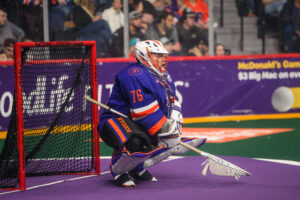
“Most kids growing up wanting to play in the NHL, the NFL, or the NBA, but for us here in the lacrosse community of Six Nations, we want to grow up and play in the NLL,” Hill said. “So, the day I finally got to throw on a jersey with the last name ‘Hill’ on the back, it was awesome.”
Building off of previous success will be critical to Hill’s future success. He has mentors and confidants who have lived his dream. Now it will be imperative to keep stacking those building blocks to reach the ultimate goal. Yet, what matters most is that Hill can make a name for himself, continue his family legacy, and live out the dream of many Indigenous youth.
By Adam Levi
